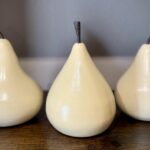Planting the seeds
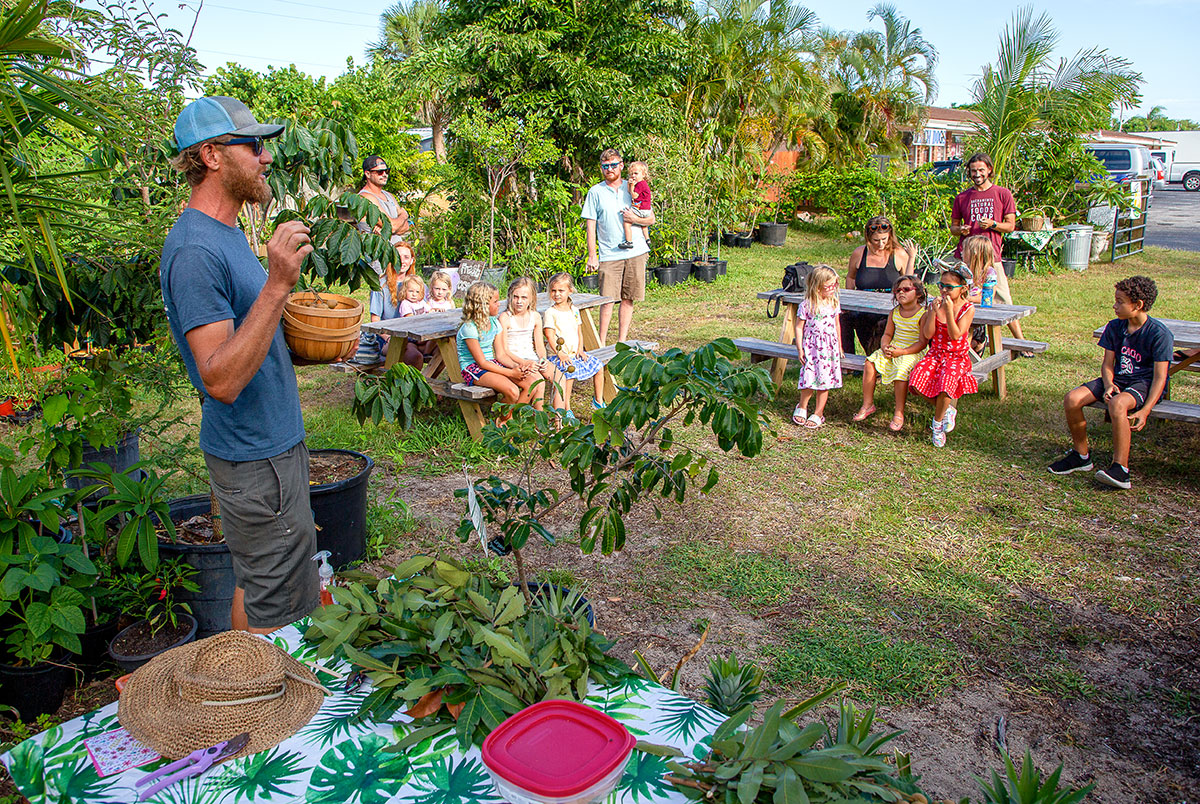
Thacker’s relaxed atmosphere and open-air classroom attracts families every Monday afternoon at Banana River Yard in Satellite Beach. MICHAEL R. BROWN PHOTOS
Nursery’s innovative program cultivates future nature lovers
By Cynthia Van Gaasbeck
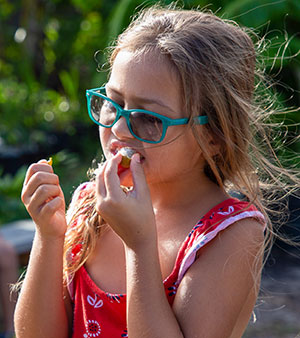
Catherine Chickowski bites through the woody skin of the longan to reveal the juicy fruit within.
Educators might know they’ve hit the mark when their students can’t wait to come home from Walt Disney World in order to soak up their knowledge.
The students’ enthusiasm could come from teacher Ben Thacker’s chill approach to dealing with human sprouts or it could be that the Plant School doesn’t feel like school at all.
The year-round educational program at the Banana River Yard in Satellite Beach is an hourlong session on Monday evenings. The atmosphere is more like a neighborhood get-together than a class for the grammar school set. But make no mistake, lessons are being slipped in with the fun.
On a recent Monday, 24 children ranging in age from 6 months to 12 years roamed the tiny jungle along South Patrick Drive.
Among them were the Chickowski sisters: Catherine, 7, and Sylvia, 4. Parents Paul and Ericka Chickowski have been bringing them to the yard for a year, after learning of the innovative program through a friend.
The Satellite Beach couple says the girls are passionate about the school, to put it mildly.
“We got back from the Magic Kingdom this morning,” Paul Chickowski said. “We were in Orlando for a couple of days and all Catherine could talk about on the way home was Plant School. She was very enthusiastic about coming tonight.”
When asked why the family chooses to spend Monday evenings there, the answer mirrors the yard’s own raisons d’être: “It’s a fun sense of community as well as something educational for the kids.”
They sneak the education in “between the snacks and the adventure walk,” he noted.
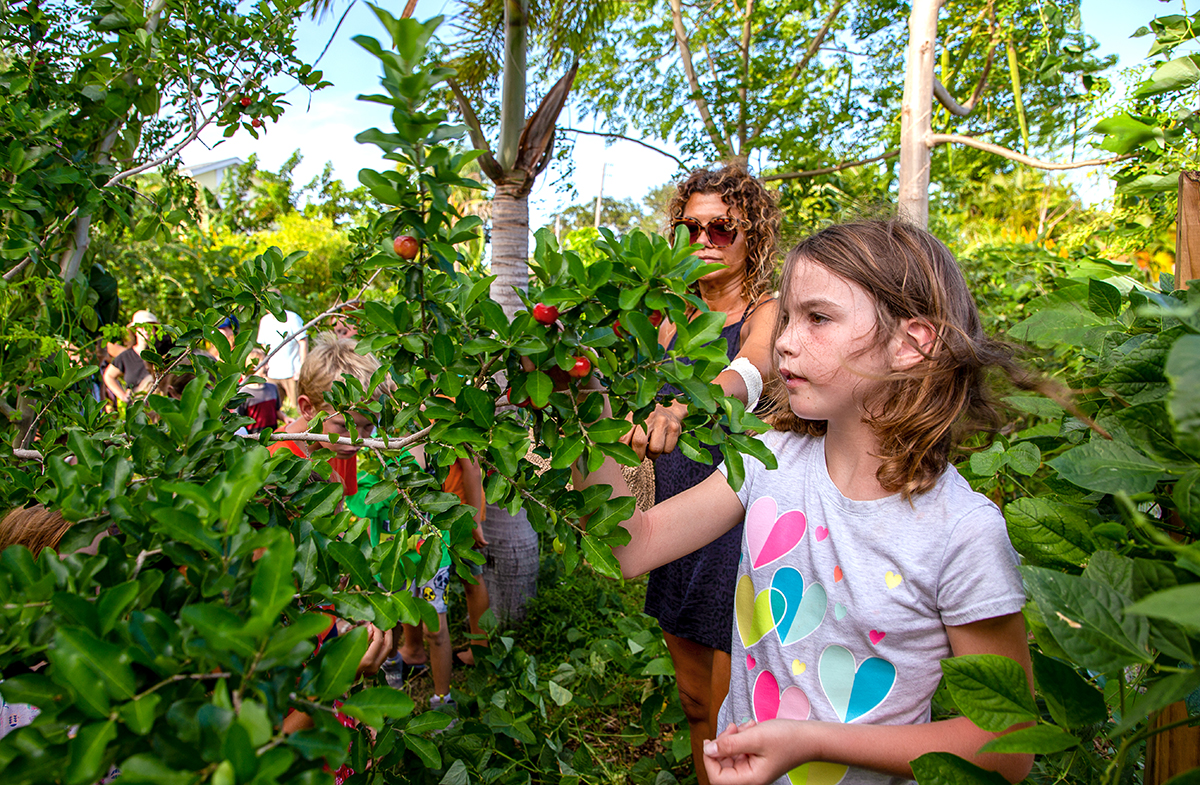
Bella Grace Payne and the nursery’s herbalist MariaElena Marks-Monge pick cotton candy berries for the students in the class to taste.
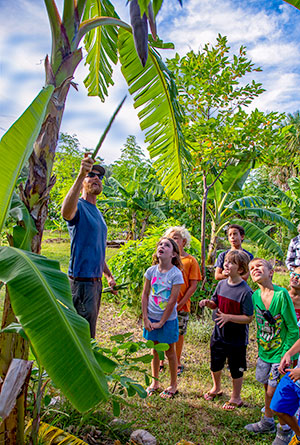
Ben Thacker uses a drumstick seed pod from a Moringa oleifera while conducting a tour at the Banana River Yard for students, front row, left to right, Bella Grace Payne, Sam Greer, Bryton Hulse; back row, left to right, Julian Thacker and Davis Penn.
MULTIPURPOSE PLAN
Three objectives guide the Banana River Yard operation, but at its essence it is a nursery selling exclusively tropical and subtropical plants that produce edible and medicinal fruits, seeds, stalks and leaves.
Thacker and business partner Ryan Gibbons opened the nursery a year ago on land that was once deemed too small for anything. Gibbons’ family owns the half-acre tract and the shopping center next to it, Lori Laine Plaza. The two came up with the same idea at about the same time and finalized their vision by filing the necessary paperwork with the state. The initial financial outlay was minimal, with the nursery’s original stock coming from Thacker’s Satellite Beach yard.
The hyperlocal approach is practical, given the hot, humid and salty coastal environment. As more northerners become Floridians, the knowledge gap becomes more evident and frustrating. Most know that you can’t move to the beach and expect to nurture foliage from cooler climes. But even the right plant for the environment is going to need a hand.
Banana River Yard’s second objective is to be a free-flowing font of knowledge. There is no charge for advice. But in the slightly more-formal atmosphere of Plant School, Thacker and herbalist MariaElena Marks-Monge request a $10 donation per participant to help defray costs.
“We have a pretty loose approach, as you can see by the coffee can money jar,” Thacker said. “Some people pay more, some pay less. We don’t really ask, but the money does help cover the cost of materials.”
Its third objective — to be a community meeting place — happened by design with classes such as yoga in the yard and the Plant School where parents get to know each other.
The school’s drop-in nature means that no one knows how many children will attend each week but there is a core of dedicated families who support the effort.

Students fill their seedling pots with rich soil composted at the yard.
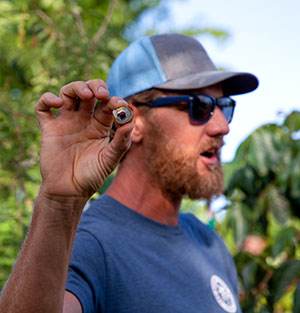
Thacker explains what a dragon eye, aka longan, is.
UNIQUE CLASSROOM
If a child were to create a classroom, it might look like the one Thacker and Marks-Monge have assembled. There are picnic tables, hanging plants, potted plants and planted plants, most of which are heavy with fruit. There are no doors, no walls, no windows and no floor — just sunshine and sky, greenery and earth.
Also missing are books on desks, whiteboards and certainly, there are no exams. Tasting, smelling, seeing and touching are the lesson drivers and the methods produce a gentle, organic transfer of knowledge.
The students learn, for instance, that if they care for a Jamaica cherry [Muntingia calabura], they will be rewarded with handfuls of cotton candy berries.
Everything at the yard is a treat for the senses, and that’s intentional. Thacker and Marks-Monge want children to be in love with nature and have a practical, working relationship with it. In Plant School, the young ones taste the fruit, learn how to say its name, learn its propagation technique, sample a recipe made from the fruit and take home a pot in which to grow their own.
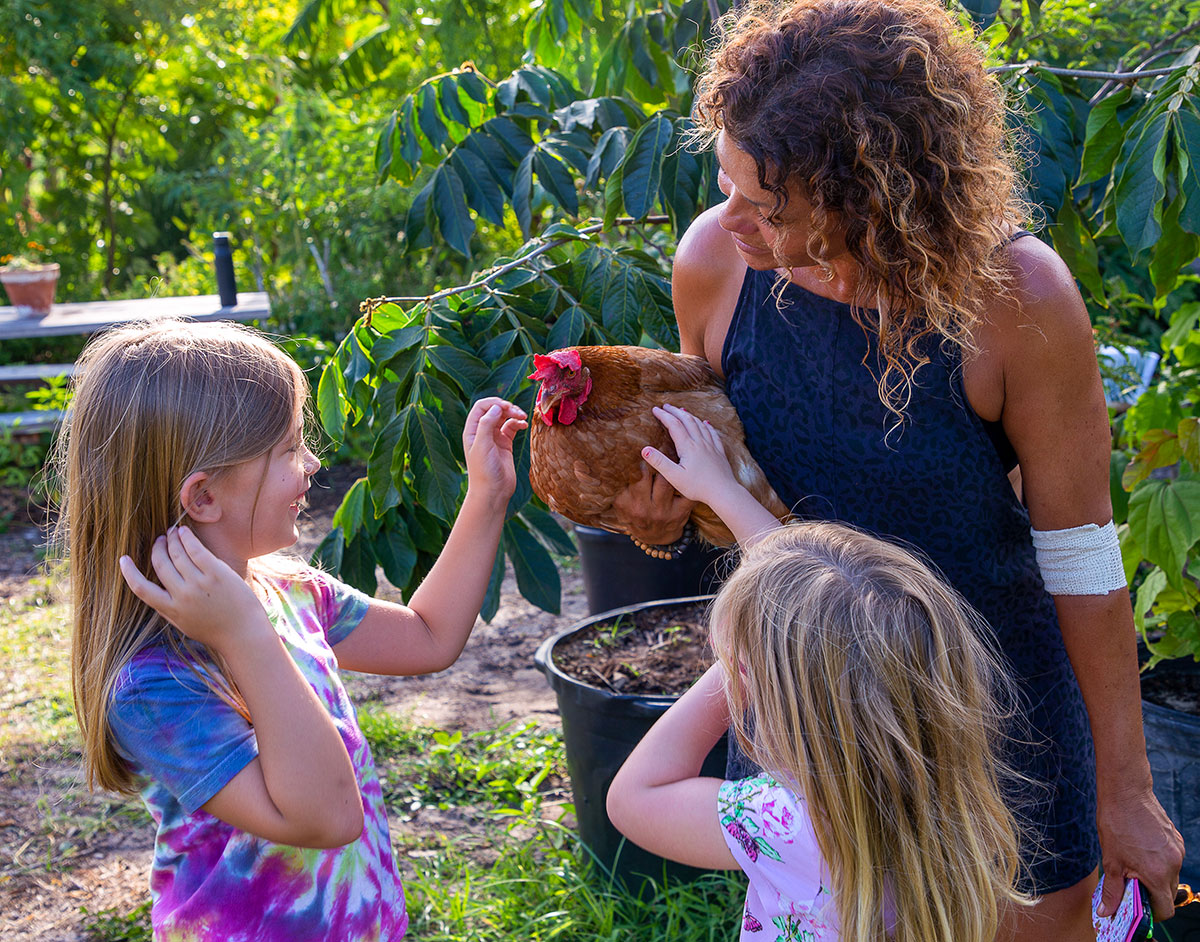
Marks-Monge holds one of the yard’s resident chickens for Jemma Greer and Leonora Skeen to pet.
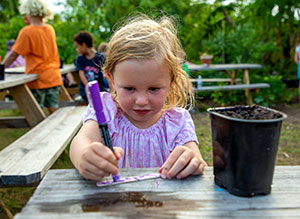
A young student makes a popsicle-stick marker for her longan pot.
NATURAL TEACHERS
Plant education is a passion for Thacker, whose own children, Julian, 8, and Zuri, 6, have absorbed the message and live it daily. They surf, skate, ride bikes, harvest and forage alongside their dad.
Marks-Monge, a mother of four and a grandmother of one, relies on her Costa Rican family history for real-life experience working with medicinal herbs. She learned ancient methods of holistic healing and plant medicine from her grandmother, who was the town medicine woman.
Thacker, who has a degree in journalism and has worked extensively as a photographer, sees a multitude of reasons to engage young minds through hands-on teaching. Chief among them is that children who feel connected to nature are more likely to grow up to be thoughtful stewards of the land, he explained.
Already a favorite enrichment activity of area homeschoolers, Banana River Yard will soon be a destination for at least one public school, Thacker said.
“We are going to be working with Surfside Elementary this coming year, partnering with their 4-H club and their PTO as well,” he explained. “The school is right around the corner from us. Both Ryan’s kids and my kids go to school there.”
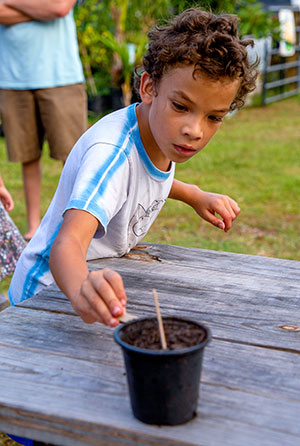
John Penn drops a longan seed into his seedling pot to take home.
FESTIVE, FUN, FACTS
The mood on this particular evening was festive with an anticipatory air. Thacker and Marks-Monge build each class around a particular plant and this week’s discussion was on the longan [Dimocarpus longan], a globular sugar bomb similar in taste to its cousin the lychee, which is native to China but grows exceedingly well in Brevard County.
After the plant of the week introduction, the class explored the yard’s dozens of food-producing trees and bushes. Thacker leads the class Pied Piper-like along the U-shaped trail while Marks-Monge brings up the rear and keeps the stragglers focused.
The conversational lecture was filled with facts.
“The longan is in the soapberry family, which doesn’t sound very appealing but these are delicious,” Thacker explained. “They’re also called dragon eyes. That’s what longan actually means in the Chinese language.”
The tour is one component of Plant School and is meant to be highly interactive. The children were engaged, with some asking questions while others spouted facts from past classes. The group stopped frequently to pick and eat fruit right from the trees.
After the tour came a snack made of the fruit of the week. For this one, Marks-Monge chose to bake a vegan macaroon topped with a longan.
“I used my vegan coconut cookie dough, which is coconut flour, a little bit of coconut oil,” she said. “The longans are really sweet, so I chopped some into the dough for sweetness and put a longan on top.”
Jeremy and Amanda Greer of Cocoa Beach have been bringing their son, Sam, 8, and daughter, Jemma, 6, to the weekly class for about six months. They met Thacker and Marks-Monge at the Satellite Beach Farmers Market at Pelican Beach, where some of the yard’s bounty is sold each Thursday.
“We went to the farmers market and they were there,” Amanda Greer explained. “Our son is on the autism spectrum and his special interest is the scientific names of plants and he and Ben just started talking.”
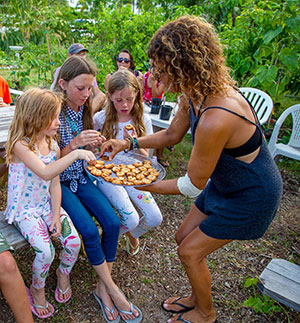
Marks-Monge offers longan macaroons to the class.
REWARDING EXPERIENCE
An invitation ensued and the experience has been so positive that she features the Plant School on her homeschooling website, Trees and Tide [treesandtide.com].
“It’s been good for our family,” Amanda Greer said. “Of all their enrichment activities for homeschooling, this is their favorite.”
“My son absolutely looks forward to class,” she continued. “He likes it when they choose what plant they’re going to do and he looks forward to getting the announcement for it. It’s different every week but it follows a structure, so it’s comfortable for him.” Jeremy Greer agreed.
“It’s kind of free-form but with enough structure so there is guidance,” he said. “The kids absolutely love the class.”
It takes a special kind to speak to children without speaking down to them and Thacker possesses that ability, along with a Zen mindset that exudes calm amid chaos.
“I try to keep the experience as positive as possible for everyone, including me,” Thacker said after class. “The plants in the yard are there for everyone to enjoy, especially the kids. We are thrilled to be able to provide those experiences, as long as everybody is respectful of the garden and each other,” he explained.



